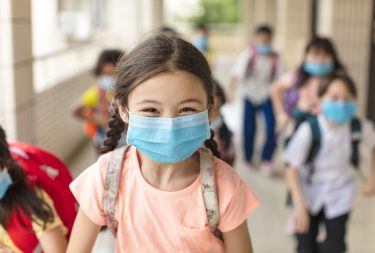May 13, 2021
Testing a Safe & Confident Return to Classrooms for Latino Youth

Yakima Valley residents faced the highest rates of COVID-19 diagnoses and deaths in Washington state during the height of the pandemic last year. Many of these community members are rural, Latino agricultural workers who were already experiencing health disparities before the pandemic. While schools move to virtual lessons as needed to help slow the spread of COVID-19, researchers at the University of Washington are helping the Yakima Valley community better understand how to safely and confidently return to classrooms. In-person school has long served as a vital resource for communities like Yakima Valley, providing food, emotional development and therapy, physical activity, internet access, after school programs, and more.
Thanks to $4 million in funding from the National Institutes of Health, the University of Washington and its partners are collaborating with elementary schools in the Yakima Valley to evaluate how effective COVID-19 testing, safety measures, and communications around COVID-19 can be at safely increasing in-person attendance. Until a COVID-19 vaccine is approved for youth and children, testing, safety measures, and communications around the virus may be essential for instilling confidence in a safe return to classrooms. This could be especially true for those in communities most severely affected by COVID-19 and/or those exposed to misinformation about the virus.
Linda Ko, University of Washington Health Promotion Research Center investigator, is co-leading this study alongside infectious disease specialist Helen Chu in UW Medicine who also leads the Seattle Flu Study, which is in its third year. UW is also collaborating with Parth Shah — a behavioral scientist and pharmacist at Fred Hutchinson Cancer Research Center — and community health workers at Fred Hutch’s Center for Community Health Promotion (CCHP) in Sunnyside, Washington. The partnership that CCHP has established with researchers such as Ko is nationally recognized as a model for community-based participatory research.
“From our medical and communications experts to our partners in the community, we’ll work together to determine the safety of and community confidence in returning to in-person classes,” Ko said.
A pilot trial begins this spring with nasal swabs for COVID-19 testing at one school district. The project will expand to a larger trial of 16 schools across multiple school districts in Yakima Valley this coming fall, including about 900 kindergarten through eighth grade students. Along with COVID-19 testing this fall, researchers will collect data about student absences and assess physical activity and stress among students, staff, and families. Researchers will also look at the availability and use of safety measures in classrooms — for example, hand sanitizer use, mask wearing, ventilation, and social distancing. Study materials and communications will be culturally appropriate and provided in Spanish and English.
Ultimately, the study team will produce a collaborative manual for schools to help mitigate concerns and improve safety while returning to the classroom. This study may also contribute to vaccination efforts when a COVID-19 vaccine for youth and children is available.
“As students return to classrooms, we want to see how effective COVID-19 testing, safety measures, and communication can be at reducing stress and concern around in-person learning, in addition to improving safety,” Chu said. “It’s important that students, their families, and the staff at schools be safe as well as feel assured that they are safe.”
The study will also include guidance and feedback from six members of a Community Advisory Board who have partnered with Ko on multiple community-based participatory research projects. The board will include school district employees or partners and influential community members like Sandra Linde who is a chaplain of Astría Hospital and a Sunnyside School District board member. “We want our students and staff to be safe,” she said. “Expanding the great partnerships we have had with Dr. Ko and her team will give us the ability to learn how to do this together as a community.”
Oralia Cisneros, a paraprofessional at the Granger School District and long-term Community Advisory Board member, echoed the same need to work together with local partners and UW collaborators. “Returning to in-person school continues to be of great concern for many people in the Yakima Valley, including myself,” Cisneros said. “I feel a sense of peace knowing that the University of Washington and its partners are working with some of our schools to evaluate how we can safely continue to increase attendance.”
This study is one of the National Institutes of Health (NIH) Rapid Acceleration of Diagnostics-Underserved Populations (RADx-UP) projects, which aim to ensure that all Americans have access to COVID-19 testing and focus on communities most affected by the pandemic. Learn more about RADx-UP initiatives that are supporting the safe return to in-person school.
This research was, in part, funded by the National Institutes of Health (NIH) agreement number 1 OT2 HD107544-01. The views and conclusions contained in this article are those of the authoring organization and should not be interpreted as representing the official policies, either expressed or implied, of the NIH.
This project is also known as Re-Opening Schools Safely and Educating Youth (ROSSEY).
The UW Health Promotion Research Center is in the Department of Health Systems and Population Health within the School of Public Health. The department was previously the Department of Health Services. This name change took place July 1, 2021.